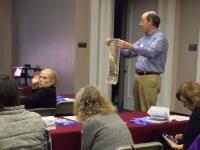Register today for workshops this spring on topics from labor to international trade to language learning.
Wednesday, February 15, 5:00-8:00 p.m.
3 credits - $5
Teachers will learn about the history of industrialization and the railroad in Philadelphia, examining primary sources that can be used to raise understanding of the subject within the classroom. Then participants will take part in an author talk with a historian who will lead a discussion about how Philadelphia transit workers adapted to fast-paced technological innovation while fighting management to secure their rights as employees. After the discussion, teachers will share ideas for integrating the information into their curriculum and leave with resources on industrialization and unions in Philadelphia.
Using Primary Sources to Teach About Global Philadelphia
Saturday, April 14, 9:30 a.m. – 12:30 p.m.
3 credits - $10
Students today need to understand Philadelphia’s role in the world both in the past and in the present in order to become career and college ready, living and working in a global economy. This teacher workshop for those teaching U.S. and World history is built on the rich blog series about Philadelphia history written by Sarah Sharp, the Educator of World Heritage Philadelphia., who has used HSP primary sources to tell some of that story (http://hsp.org/education/for-teachers/educators-blog). Come interact with the sources yourself and develop ways of incorporating this history into your classroom, examining race, gender, and class across time. You will have a chance to choose two of these three topics for in-depth study: the colonial and new nation period, War of 1812 through Civil War, and Reconstruction through 20th century. Refreshments will be served, and instructional materials distributed.
Discussing Citizenship in the Classroom
Wednesday, April 18, 5:30-8:30 p.m.
3 credits - $5
As the news cycle continues to bring stories about how the U.S. government defines and controls immigration, there is debate about who should be allowed to become a citizen. But what does it mean to be a citizen, and how do we test it? Examine sources from the American past to see how citizenship has been defined and then participant in a public program with sociologist Dr. Faye Allard-Glass. She will lead an interactive workshop that has participants comparing their experiences with citizenship requirements here and in other countries. Can you pass a U.S. naturalization test? Does it measure the qualities and knowledge you think citizens need? Take away this new model for classroom discussion.
Wednesday, June 6, 5:30-8:30 pm.
3 credits - $5
How does the acquisition of English affect the immigrant experience in the U.S., especially across generations? How is assimilation in all aspects of life affected by the language one speaks? During the workshop, we will consider how language acquisition affects life outcomes and the role schools have played in English language learning. Leave with knowledge and resources for putting this hot topic into a historical context for students.
Register today through hsp.org/calendar

